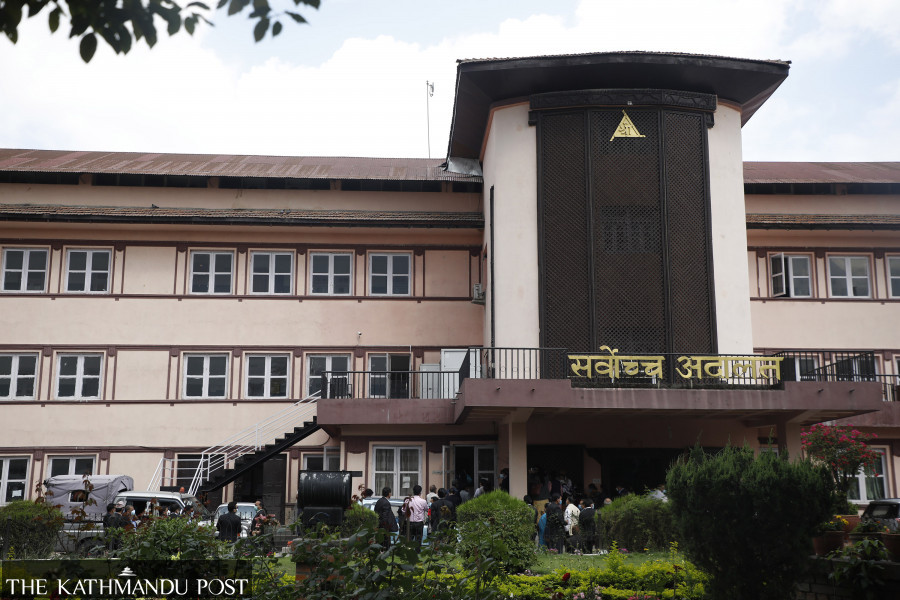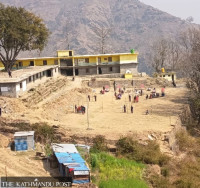National
Lawyers defending House dissolution face intense grilling
Chief Justice Cholendra Shumsher Rana asks lawyers whether it is mandatory for the President to appoint a prime minister after Article 76(5) is invoked.
Tika R Pradhan
Justices of the five-member Constitutional Bench, which started hearing the House dissolution case since last week, have been seeking response to the questions raised by the lawyers of the writ petitioners from the defendants’ lawyers.
The first half of Tuesday’s hearing remained more like a question-answer session with the justices posing questions to the government lawyers as soon as the hearing began.
Chief Justice Cholendra Shumsher Rana said that Article 76(5) of the constitution was meant to appoint a prime minister and there have been questions after no prime minister was appointed. He asked the defendants’ lawyers whether it is mandatory for the President to appoint a prime minister after the article is invoked.
Chief Justice Rana raised the question as Deputy Attorney General Padma Prasad Pandey argued that it is entirely up to the President whether to appoint a prime minister or not.
Pandey said the President did not appoint a prime minister because she did not find sufficient grounds.
But Rana replied that the President should have given another chance to make bids for prime minister. “If the basis for vote of confidence was not presented another chance should be given as 76(5) isn’t for not appointing a prime minister. If both the bids didn’t have sufficient grounds another chance should have been given,” Rana said.
When Pandey argued that the prime minister appointed as per Article 76(3) can make a bid for prime ministership as per Article 76(5), Chief Justice Rana asked him whether a prime minister appointed as per Article 76(3) can announce he won’t go for a floor test. “Shouldn’t the announcement be made through Parliament? How can Parliament be bypassed?” Rana asked.
Pandey, however, said the prime minister need not go to Parliament if he thinks he cannot win a confidence vote. There was no such provision in the constitution. In such a situation, he claimed that the prime minister could inform the President about the Cabinet’s decision to pave the way for a new government as per 76(5) if s/he sees there is no possibility of winning a confidence vote.
Now it was the turn of Justice Mira Khadka, who questioned Pandey whether Article 76(5) makes it mandatory for the President to appoint a prime minister. Her question came after Pandey argued that the President may not appoint a prime minister if necessary conditions were not fulfilled.
"Article 76(5) says if a basis was presented. There is no qualifier on the term basis. It does not say if the President feels the basis is credible. So doesn’t that make it mandatory to appoint a prime minister," Khadka asked. "Is it not Parliament which examines the appointment?"
Responding to government lawyers' argument that the President's decisions cannot be a subject of judicial review, Khadka said the power of judicial review lies with the judiciary.
Prime Minister Oli had refused to go for a floor test and instead asked the President to invoke the process of government formation as per Article 76(5) on May 20. The move was contested by legal experts and lawyers pleading on behalf of the writ petitioners saying that the prime minister who admitted that he has no chances of winning a confidence vote in Parliament cannot lay claim for prime ministership as per Article 76(5).
They have also said that Prime Minister Oli’s claim to the post of prime minister constituted a fraud on the constitution.
“Oli’s attempt to lay claim to prime ministership as per Article 76(5) was nothing but a fraud on the constitution,” senior advocate Krishna Prasad Bhandari had said on Sunday. “And the President supported him.”
While another Deputy Attorney General Bishwaraj Koirala claimed that if the members of parliament elected from one party are allowed to support the leader of another party, the country would plunge into instability.
He was referring to the 26 lawmakers representing the Madhav Nepal faction of the CPN-UML and 12 members of the Upendra Yadav-led faction of the Janata Samajbadi Party who had supported Nepali Congress President Sher Bahadur Deuba’s bid for prime minister.
One of the five justices on the Constitutional Bench Ishwar Prasad Khatiwada questioned Deputy Attorney General Pandey whether the court’s decision in February to restore the dissolved Parliament was the sole reason for the political stability in the country.
While pleading on Tuesday, Pandey had said that in India House dissolution brought stability and therefore the Supreme Court of Nepal should also endorse the House dissolution to ensure political stability.
During the hearing Justice Khatiwada said the written response of the defendants and their lawyers have indirectly said the court’s decision was the sole reason for political instability in the country.
“Is the court’s decision the sole reason behind the political instability or are there other reasons as well?” Khatiwada asked.
Justice Khatiwada argued that a dissolved House was restored in 1995 and that continued later as well but instability also continued as governments kept changing.
Pandey agreed, saying the restoration alone was not the sole reason but one of the many reasons for political instability.
However, a large section of society believe that polls are not possible at the time of pandemic and that Parliament must not be dissolved until it could give a government.
So far, four deputy attorney generals Padma Prasad Pandey, Bishwaraj Koirala, Tek Bahadur Ghimire and Shyam Kumar Bhattarai have concluded their arguments and now the defendants’ lawyers have seven hours and 55 minutes to present their defence.




 27.41°C Kathmandu
27.41°C Kathmandu














